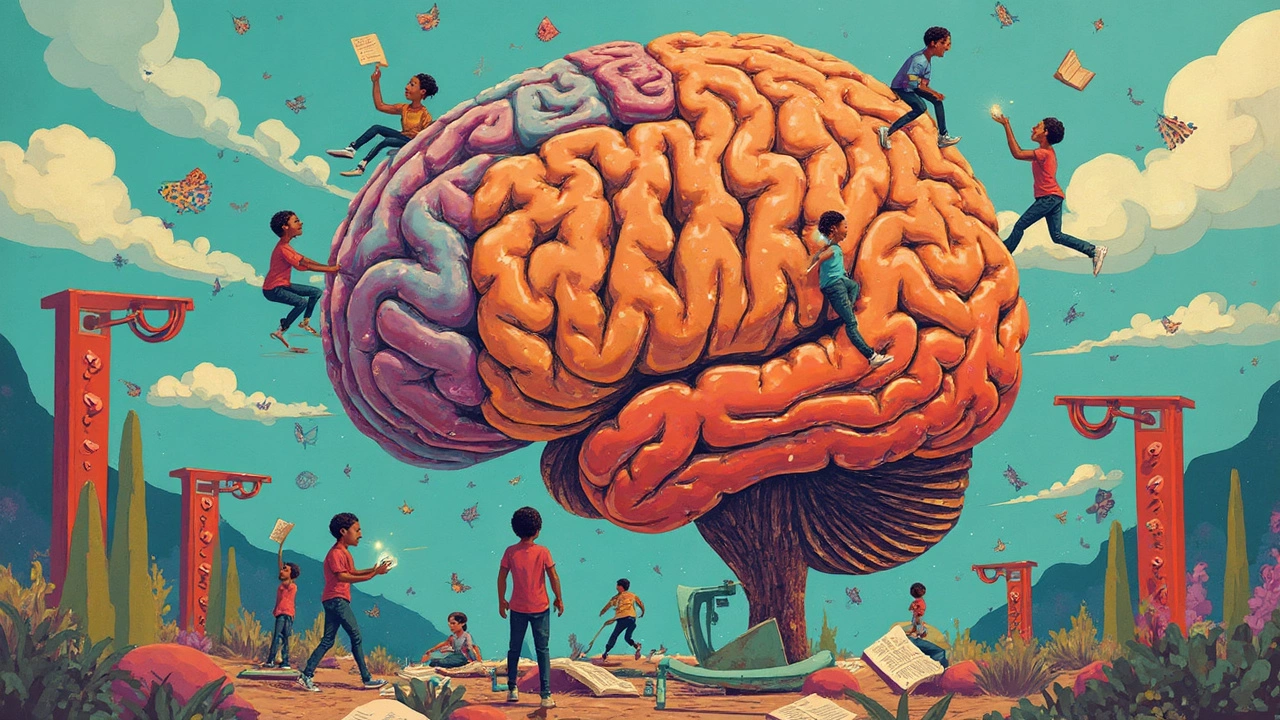
Most people focus a lot on physical fitness and aren't paying enough attention to what's going on up top. But being mentally fit is just as crucial. So, how can you keep your mind in tip-top shape? It's a mix of good habits, a bit of brain exercise, and knowing how to handle stress.
First off, let's talk about daily habits. It's kind of like brushing your teeth - small actions add up to big benefits. Simple things like getting enough sleep, eating a balanced diet, and staying hydrated can significantly impact your mental wellbeing. Plus, starting your day with a short mindfulness routine or a walk outside can set a positive tone.
- Understanding Mental Fitness
- Daily Habits for a Healthy Mind
- Exercise Your Brain
- Stress Management Techniques
- The Power of Social Connections
Understanding Mental Fitness
So, what's the deal with mental fitness anyway? It's not just about having sharp memory or solving puzzles faster than your friends. It's about keeping your mind flexible, able to handle whatever life throws your way, and being resilient in stressful situations. Think of it as having the strength to thrive mentally, just like you'd train your body to be physically strong.
One important aspect to recognize is how closely mental and physical fitness are linked. Studies have shown that regular physical activity can boost brain health and improve cognitive functions. It's like hitting two birds with one stone – keeping your body fit helps keep your mind fit too.
Mental fitness also involves emotional well-being. It's about understanding and managing your emotions, being mindful of the present moment, and maintaining a positive outlook. This isn't always easy, especially when life gets hectic, but it's definitely worth working on. Being mentally fit can reduce anxiety, improve mood, and even enhance your relationships.
Think of your brain as a muscle. It needs to be challenged, stimulated, and occasionally rested properly. Engaging in activities that stimulate your mind, like learning new skills, reading, or even playing memory games, can help maintain and improve cognitive health.
People with high mental fitness usually report better decision-making and problem-solving skills. They're often better at managing stress and more adaptable to change. Imagine being able to tackle your work with a clear head and still having the energy for your hobbies after a long day. That's the power of a mentally fit brain!
Daily Habits for a Healthy Mind
Keeping up with daily habits is like giving your brain a regular tune-up. You don't need anything fancy—just simple, everyday stuff that boosts your mental fitness without a fuss.
Let's start with sleep. It's essential for a sharp mind. Adults need about seven to nine hours of quality sleep each night. Not just any sleep—quality matters. Cut off screens at least an hour before you hit the sack to help your mind wind down.
Next, don't overlook what you eat and drink. A balanced diet rich in fruits, veggies, lean proteins, and whole grains supports brain health. Omega-3 fatty acids found in fish like salmon are great for the brain too. And remember, hydration is key. Even mild dehydration can mess with your concentration and mood.
Moving on, a splash of sunlight each morning can work wonders. It helps set your body's internal clock and boosts your mood, thanks to vitamin D production. So, step outside for a few minutes—your mind will thank you.
- Exercise routinely: Whether it's a quick walk or a session at the gym, regular exercise releases feel-good chemicals in the brain.
- Practice mindfulness: Spend a few minutes a day meditating or doing yoga to help clear your mind and reduce stress levels.
- Keep learning: Challenge your brain with puzzles, reading, or learning a new skill. This keeps your brain adaptable and vibrant.
It's amazing how these small changes can stack up to make a big difference in staying mentally fit. Shop for these habits like they’re on sale; investing in your mental fitness can bring returns for life.

Exercise Your Brain
Just like your muscles, your brain needs a bit of a workout now and then. Keeping it active can do wonders for your mental fitness. It's not all about crosswords and Sudoku—though those are great too!
Try mixing it up with these ideas:
- Learn something new: Picking up a new hobby or skill can stretch your mind in new ways. Whether it's a language, cooking, or an online course, learning keeps your brain engaged and growing.
- Play games: Video games, puzzles, and board games are not only fun but also great for your brain. They improve cognitive skills like strategic thinking, memory, and even social interaction.
- Read regularly: Reading is a workout for your mind, no question. It can improve focus and concentration, plus it's a great stress reliever.
- Challenge your memory: Try memory games or even something as simple as reciting phone numbers backwards. It helps improve both focus and concentration.
According to some neat stats from a recent study, adults who engaged in cognitive activities at least three times a week showed a 30% lower decline in mental abilities compared to those who didn't.
| Activity Type | Mental Boost |
|---|---|
| Puzzles | Enhances problem-solving skills |
| Language Learning | Improves memory and multitasking |
| Reading | Increases vocabulary and empathy |
Keeping your brain busy with varied activities helps it adapt and stay sharp. Plus, it's a blast to discover what you enjoy most!
Stress Management Techniques
Alright, let's talk stress. Everyone's got it, but not everyone knows how to handle it. Managing stress is key to staying mentally fit and keeping your mind sharp. There are a bunch of techniques you can try out, and you don't need anything fancy to get started.
Firstly, consider embracing some form of regular physical activity. Physical and mental fitness go hand in hand. Exercise helps release endorphins, which are basically natural stress-busters. Even something as simple as a daily 30-minute walk can do wonders for your mood.
Another way to keep stress at bay is through mindfulness and meditation. It's about taking a few minutes each day to just breathe and focus. You don't have to sit cross-legged or chant; it can be as simple as closing your eyes and counting your breaths. Apps like Headspace and Calm can guide you, making it easier to get started.
Don't underestimate the power of a good to-do list. Organizing your tasks can keep that overwhelming feeling in check. Break tasks into small, manageable steps so you can tackle them one at a time rather than feeling swamped by everything at once.
- Prioritize tasks based on urgency and importance.
- Break large projects into smaller chunks.
- Set realistic deadlines to maintain motivation.
Sometimes stress amps up when we're disconnected from people. Keeping in touch with friends or family, even if just a quick chat, can anchor you. Need a reason to connect? Arrange a weekly Zoom call or a regular meetup.
If you're curious about understanding how stressed you actually are, here's a quick breakdown:
| Stress Level | Signs and Symptoms |
|---|---|
| Low | Mild discomfort, slight worry |
| Medium | Restlessness, mild anxiety |
| High | Overwhelming feelings, intense anxiety |
Finally, remember it's okay to ask for help. If stress gets too much, talking to a professional can provide you with extra tools tailored to your needs. So take it easy, and give these techniques a shot. Who knew staying mentally fit could be this easy?

The Power of Social Connections
Ever noticed how hanging out with friends or family gives you an instant mood boost? That's because social connections are a big deal for staying mentally fit. Humans are naturally social creatures, and maintaining strong relationships can help reduce stress, increase happiness, and even improve cognitive function.
Studies show that people with rich social networks often have better brain health as they age. This isn't just about talking with your friends on social media. It's about real, meaningful conversations and connections. So, make it a priority to catch up with a buddy over coffee, or join a club where you meet new people.
Let's break it down: regular social interactions can help you manage stress better. When you're feeling overwhelmed, talking to someone who understands can provide relief and perspective. Plus, being social encourages the release of feel-good hormones like oxytocin, which boosts your mental health.
Try to keep it natural. Call up an old friend, join a team sport, or volunteer at a local community center. These connections not only make life more enjoyable but also keep your mind active and engaged.
Here's an interesting find: Researchers discovered that older adults with strong social ties have a 70% lower chance of cognitive decline compared to those who are isolated. So, picking up that phone or making plans for a group outing does wonders beyond just having fun!